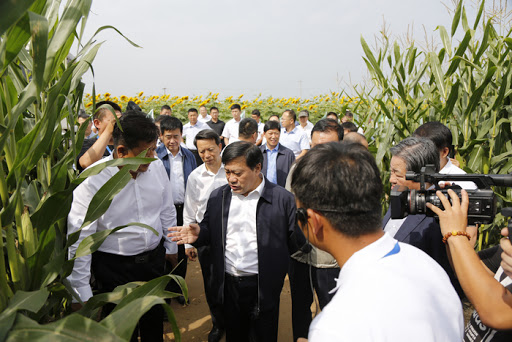If you're thinking about starting a socialist country, you might want to take note: after 70 years of socialism, China's elite Chinese Academy of Social Sciences (CASS) has pronounced that,
"the rural collective economy is still at a low level of development [italics added], its development is uneven, and it lacks sustainability and profitability."
The comments were made at a Beijing forum on CASS's Rural Development Report in preparation for writing the 14th five-year plan for 2021-25.
The report's unusually candid assessment identified rural problems and "contradictions" that include weak farming incentives, difficulty achieving sustainable income growth, growing divisions within villages, and an aging population. CASS noted that a 135-million-metric-ton shortfall in grain supplies is projected for 2025, rural industry is unprofitable, business financing is inadequate, rural services are lacking, a rural garbage disposal problem is mounting, and soil and water resources are degraded by both industrial and agricultural pollution. The Chinese countryside lacks quality workers and business leaders, and rural youngsters are ignorant of both science and rural family traditions. Some villages are controlled by outsiders, and rural China has failed to develop a new value system to maintain a stable society, the CASS report said.
You may recall that the main selling point of the 1949 Chinese communist revolution was a "land reform" that seized land from exploitative landlords and gave it to poor peasants. Now the CASS report says China must "explore diverse types of rural collective economy reforms like land share-holding cooperative mechanisms...and forms of ownership that form alliances with society and capital." This means that village collectives need to adopt business forms that mimic capitalist corporations. In "alliances with society and capital" gargantuan urban-based businesses and banks are expected to take some of the billions they have been allowed to accumulate in cities and stock exchanges and sprinkle it over the villages.
After 60-plus years of rural collectives, Chinese communists are now working on how to re-alienate villagers from the land. The Ministry of Agriculture is working on "pilot" programs to "clarify" rights to collective land and other village property in 442 counties. Their strategy is to make collectives operate more like capitalist companies by consolidating tiny family plots into large tracts, issuing shares to villagers, then inviting in companies to operate the assets and pay dividends to rural shareholders. The villagers, in effect, become landlords who rent out their land to be farmed by a company, but the deal is made by village officials or movers and shakers who often have a much larger financial interest in the venture than the common villagers. In many cases, the company hires the villagers as wage laborers.
 |
| Village collective asset property right reforms facilitate leasing out land to companies. Source: Xinhua/CCTV. |
"Farmer cooperatives," another favorite of socialists around the world, are described in the CASS report as "weak, small, and scattered." The CASS report echoes an earlier 2017 CASS survey of cooperatives with its complaints that many farmer cooperatives are empty shells, "zombies," or dormant, with a divergence of interests between cooperative leaders and the common members. The CASS survey--conducted a decade after the "farmer cooperative law" was enacted--administered questionnaires to over 600 cooperatives and to government departments overseeing them in 12 counties. The survey found that more than half of farmer cooperatives were empty shells in some regions.
The 2007 farmer cooperative law allowed farmer cooperatives to register as business entities, permitted companies to be members, and waived taxes for farm products sold by co-ops. The CASS task force found that in many instances an individual gathered up ID cards of farmers to set up a cooperative in order to collect subsidies and tax breaks. Some companies rebranded themselves as "cooperatives" to collect the subsidies. Many farmer cooperatives are branches of agribusiness companies that sell raw materials tax-free. Orders given to local officials to increase the number of cooperatives contributed to the "zombie cooperative" phenomenon. The CASS report found that cooperatives were easy to start but never shut down. The report called for a mechanism to close dormant cooperatives. Last year, Vice Minister of Agriculture Han Jun's new idea was to double down on the model that created the problem by choosing 30 counties where communist officials would set up lots of model farmer cooperatives with even more financial subsidies.
In a manifestation of the "alliance with society and capital" model, last month the Ministry of Agriculture and Rural Affairs announced an initiative whereby gargantuan state-owned enterprises with lots of money but no practical farming experience adopt farmer cooperatives as village outposts of their businesses. The chairmen of State-owned behemoths Sinochem and COFCO and the sprawling postal savings bank joined Vice Minister Han Jun in Inner Mongolia to promote Sinochem's initiative to help farmer cooperatives by setting up village service centers that sell seeds, fertilizer and farm chemicals, offer training and financial services. Sinochem has turned 580 "farmer cooperatives" into its village service centers.
 |
| Sinochem "cooperative service center" in Sichuan Province offers seed, fertilizer, farm chemicals and training. Source: Chuanbao Guancha. |




2 comments:
Post a Comment